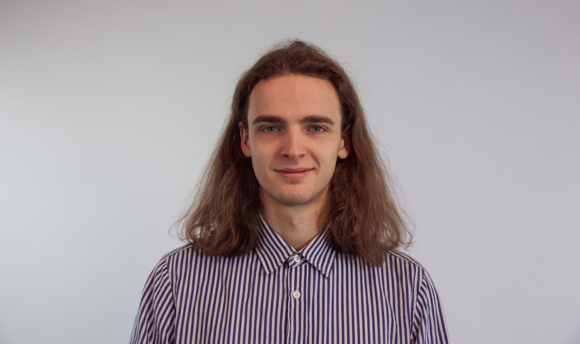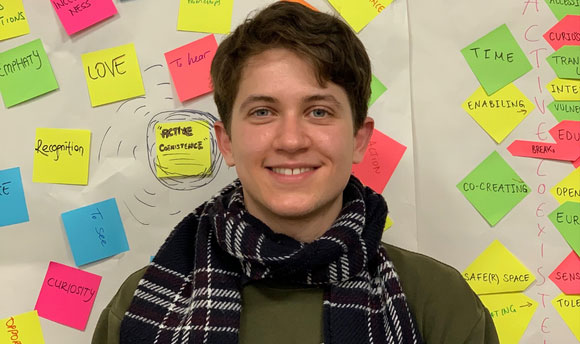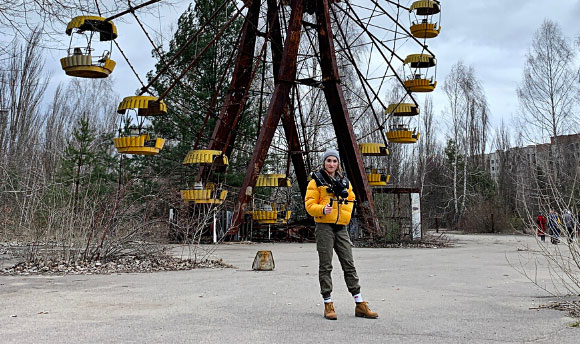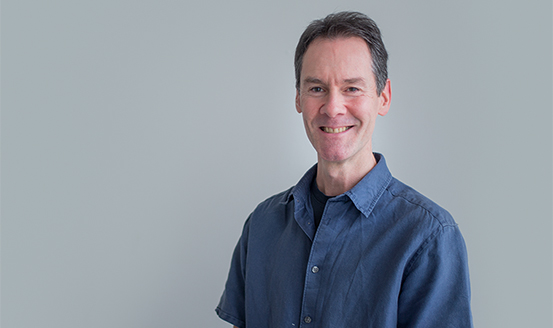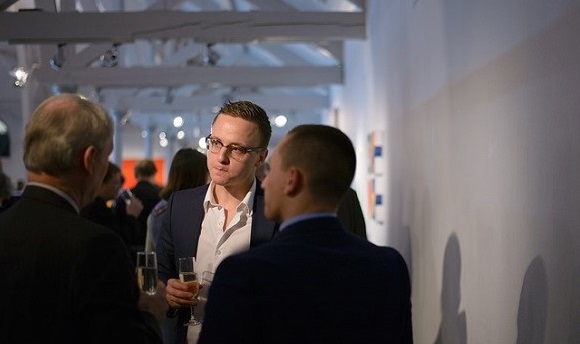This course is still open for entry in September 2024 – please visit our Clearing and Late Application page.
Theatre and Film - BA (Hons)
If you love theatre and film you can study them both in depth on the only course of its kind in Scotland. This innovative BA (Hons) in Theatre and Film course combines practical work-based learning with a solid grounding in critical studies.
And… ACTION! Film and theatre are thriving industries, creatively and commercially. This course will give you the confidence and skills you need to enter careers in theatre, film, teaching, and professions demanding communication and creativity.
Why QMU?
- Excellent facilities: We have superb on-campus resources: performance spaces, rehearsal studios, a film editing suite and TV studio.
- Potential to showcase your work: See your films screened on the big screen at the end of year show (subject to selection).
- Great location for studying this area: The creative and cultural powerhouse of Edinburgh is right on your doorstep. Get inspired by the many theatrical productions, and the International Festival and Fringe. There are plenty of internships available for you to learn real-world skills.
- Ranked highly in the UK: QMU is ranked in the top 12 amongst UK universities for Drama and Dance (Guardian University Guide 2023).
Studying BA (Hons) Theatre and Film
Theatre and Film - BA (Hons): The course in brief
On this course you will:
- experience a unique chance to study these two interrelated disciplines in depth and in tandem, developing your knowledge of live and recorded dramatic performances and preparing yourself for an exciting career;
- learn about the histories of theatre and cinema, and examine the key critical cultural and political debates; and
- explore the spaces of the stage and screen performances and the genres, forms and narratives of plays and screenplays. We also study the economics and management of theatre and cinema within the creative industries.
How will I be taught?
Structure
You can opt to study for an honours degree over four years or an ordinary degree over three years. You will complete a range of modules each year as outlined.
Teaching, learning and assessment
You learn through lectures, seminars, individual work and group work, where you will be producing a range of performance events and production material. Assessment methods include portfolios, presentations, essays, short films, screenwriting and playwriting, amongst others.
Placement/industry-based learning
You will not go on a placement as such but frequent work-based learning opportunities will help you to build your theoretical studies into invaluable real-world skills.
You will work with live clients on the 'Client Project' module in Year Two.
Exchange opportunities
In Year Three you have the opportunity (subject to availability) to study for one semester at a university overseas. Please visit the Exchanges and Study Abroad pages for more information.
Teaching staff, class sizes and timetables
You can read more about the teaching staff on this course at the bottom of this page. Please note that teaching staff is subject to change.
For more information, please also visit ‘How we teach and how you’ll learn’.
What will I learn each year?
Year One
You will:
- gain a broad understanding of how theatre and film work as creative industries; and
- start your study of theatre and film form and performance, and gain experience of creative production.
Modules
- Media Production: Skills and Techniques
- Introduction to the Study of Theatre and Performance
- Introduction to Theatre Production
- Studying Cinema
- The Origins of Theatre
- Media Production: Video Project
Year Two
You will:
- examine questions of genre and creativity alongside the theory and practice of stage and screen performance; and
- get a chance to work with real-life clients in the creative industries.
Modules
- Media Production: Storytelling
- Making Theatre
- Film Genre
- British Theatre since 1945
- Client Project
- Creative Writing for New Media
Year Three
You will:
- look at key periods, movements and practitioners in theatre and film, alongside modules in areas such as playwriting, animation and global cinema;
- create your own production projects and choose additional, optional subjects such as photography or community theatre;
- have had plenty of opportunities to gain production experience from Year One and Two, and can specialise in practice areas; and
- have the opportunity (subject to availability) to study for one semester at a university overseas. For more information, visit Exchanges and Study Abroad.
Modules
- Global Film Cultures
- Arts Funding in its Policy Context
- Current Debates in Performance Theory
- Designing a Research Project
- plus two options
Year Four
You will:
- look at the unique relationship between theatre and film in a core module on Adaptation, alongside optional modules that can shape your ambitions in creative entrepreneurship; and
- design and create your own production projects and choose additional, optional subjects such as photography, the video essay or community theatre.
Modules
- Adaption: Stage and Screen
- Creative Enterprise in the Performing Arts
- Dissertation
- plus two options
Year Three and Four options may include:
- Photography and Visual Culture
- Photography Practice
- Screenwriting
- The Video Essay
- Experiential Learning Placement
- Science Fiction, Fantasy and Horror
- Scotland on Screen
- Popular Music
- Film and the Family
- Film Festivals
- World Animation
- Communication, Arts and Activism
- The Only Way is Ethics: Art, Participation and Ethics
- Performance Art Practice (by application only)
- Writing for Radio
- Creative Learning and the Community
- Producing for the Stage
- Directing for the Stage
- Directing, Designing and Performing Shakespeare
- Directing, Designing and Performing Contemporary Plays
- Staging the 20th Century: How Scenography Built the Modern Imagination
NB The modules listed here are correct at time of posting (Feb 2023) but may differ slightly to those offered in 2024. Please check back here for any updates.
Career opportunities
Our graduates have used the specialist skills they learned on the course as a springboard to careers in theatre, film, teaching, postgraduate study and professions demanding communication and creativity. Example careers include TV production, freelance video production, festival curation, setting up their own theatre production company, assistant director, drama teacher, administrative work in creative industries.
Theatre and Film - BA (Hons): Entry requirements and application information
Entry requirements
Scottish Higher: Standard - AABB, Minimum - BBBB
A Level: BBB
Irish Leaving Certificate: H2 H3 H3 H3 H3
International Baccalaureate: 30 points
International: IELTS of 6.0 with no element lower than 5.5.
Required subjects: English, Drama or Media Studies preferred at Scottish Higher/A Level. English required and Maths preferred at Nat 5/GCSE. We can also accept National 5 Application of Maths or Lifeskills at the same grade.
Am I a Widening Access student?: We apply the minimum entry criteria to applicants who meet one or more contextual factor. To see if this would apply to you, please refer to the access and application page.
Mature/Access: We welcome applications from mature students with other relevant qualifications and/or experience. Visit our College Leavers and Mature Students Advice page for more information.
Direct Entry:
Year Two
- HNC/HND in a related subject with B/CB in the graded unit
- Scottish Higher: BC at Advanced Higher in relevant subjects plus BB at Higher
- A Level: BBB in relevant subjects
Year Three
- HND in a related subject with CB in the graded unit may be considered.
For details of related HNC and HND courses, visit our College Leavers and Mature Students Advice page.
Other requirements
A satisfactory criminal records check from the Protection of Vulnerable Groups (PVG) Scheme will be required if you select the optional module Drama in Education later in your studies.
Other costs
The cost of the PVG check is £18 or £59 (depending on the level of clearance required) and is the responsibility of the student. Please note that the cost is subject to change.
Disability/health conditions
If you have a disability, long-term physical or mental health condition, or learning disability, it should not stand in the way of your studying at QMU. However, if you are not sure whether your disability might be a barrier in your studies or in relation to the professional standards, please contact the disability service who will be able to have a conversation with you about reasonable adjustments and supports available to you.
Terms and Conditions
The delivery of this course is subject to the terms and conditions set out in our 2024/25 Entry Terms and Conditions (Undergraduate).
Awarding body
QMU
Specialist facilities film
Become your best you: study at QMU
Course Overview
Find out about our research in this area
Opportunities to meet us: open days and more
As well as open days, we offer campus tours and online events throughout the year to help you find out more about student life and studying at QMU.
Open days and other ways of meeting us: more information